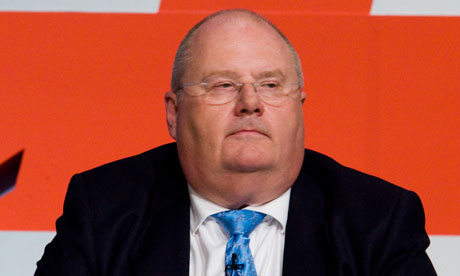
Eric Pickles, who will today tell councils they will have to do 'more for less'. Photograph: Martin Argles for the Guardian
Councils will today be told to do "more for less" as they are set their funding allocation for the next two years, revealing for the first time decisions about where the frontline cuts to social services, libraries, bin services and leisure facilities are likely to fall.
Town halls are bracing themselves for an average cut of 10.7% in cash terms, as government front-loads the 27% reduction in council spending over the next four years.
The cuts will lead to the first major wave of announcements of the closure of library, sports and childcare facilities, marking the moment that the £81bn national deficit reduction plan starts affecting local neighbourhoods.
The Department for Communities insisted that savings can be found through efficiencies and that only "lazy" councils will slash services and will today separately publish a long-awaited localism bill, setting out how the coalition is going to devolve power locally, to aid the start of the Conservatives' "big society" project.
Eric Pickles, the communities secretary, told the Radio 4's Today programme today that councils should share services to cut costs. "I believe that it is possible to take significant sums out of local authorities by improving the way in which they operate. They've simply got to wake up to the fact that it's no longer viable to have their own chief executives, legal departments, education departments … and they've got to look at ways of doing these things in partnership with local communities," he said.
"I've been offered advice by the Local Government Association as to what councils can manage in terms of the reduction of their budgets and I'm well within those figures for most of those councils. I'm being absolutely upfront, what I'm saying is I expect local authorities to provide more for less … local authorities should not have some kind of alibi that because the cuts are coming from the centre, they have to pass every cut on."
On the bill he added: "This is about a new constitutional arrangement and shifting power own to the locality and with power comes a new responsibility… I believe most councils will be able to react reasonably to these new powers."
Pickles will unveil the localism bill to parliament at 3.30pm today, and simultaneously publish the budget allocations.
Caroline Flint, the shadow communities secretary, said: "The frontloading of these cuts is too fast and too hard ... I think it's a hollow offer from the government, they are basically offering devolution of local authority services, while holding a gun to their head.
"Only a couple of weeks ago the Local Government Association indicated that because of the front-loading of these cuts they would up their estimates of job cuts from 100,000 to 140,000. Of course we can look at ways to deliver local government services, but you need time to do so. This isn't about being for or against cuts it's about how hard and how fast you go."
The Local Government Association (LGA) is predicting 140,000 job losses over the next four years and the Chartered Institute of Public Finance and Accounting predict that 70,000 of those could come in the next year alone.
Pickles has already slammed the Conservative-run LGA for scaremongering on job losses and making up figures "on the back of a fag packet", but the front-loading of the cuts in particular risks another confrontation between central and local government.
Councils are. However, pleased that the localism bill will also end the ring-fencing of many of their budgets, giving them greater freedom over how they spend their money.
Tony Travers, professor of government at the London School of Economics, said: "There's no doubt that it will be unlike anything that has been seen before in modern times, the scale of reduction in grants, which will be 27% over four years... is without precedent and it's very hard for local authorities to do that without any effect for frontline service."
Council tax has been frozen by the government, so councils face the choice of finding efficiencies, cutting services, or raising charges for car parking, for example.
Police forces will also learn of their new reduced budgets and the education secretary Michael Gove will set out plans for a new pupil premium to fund schools.